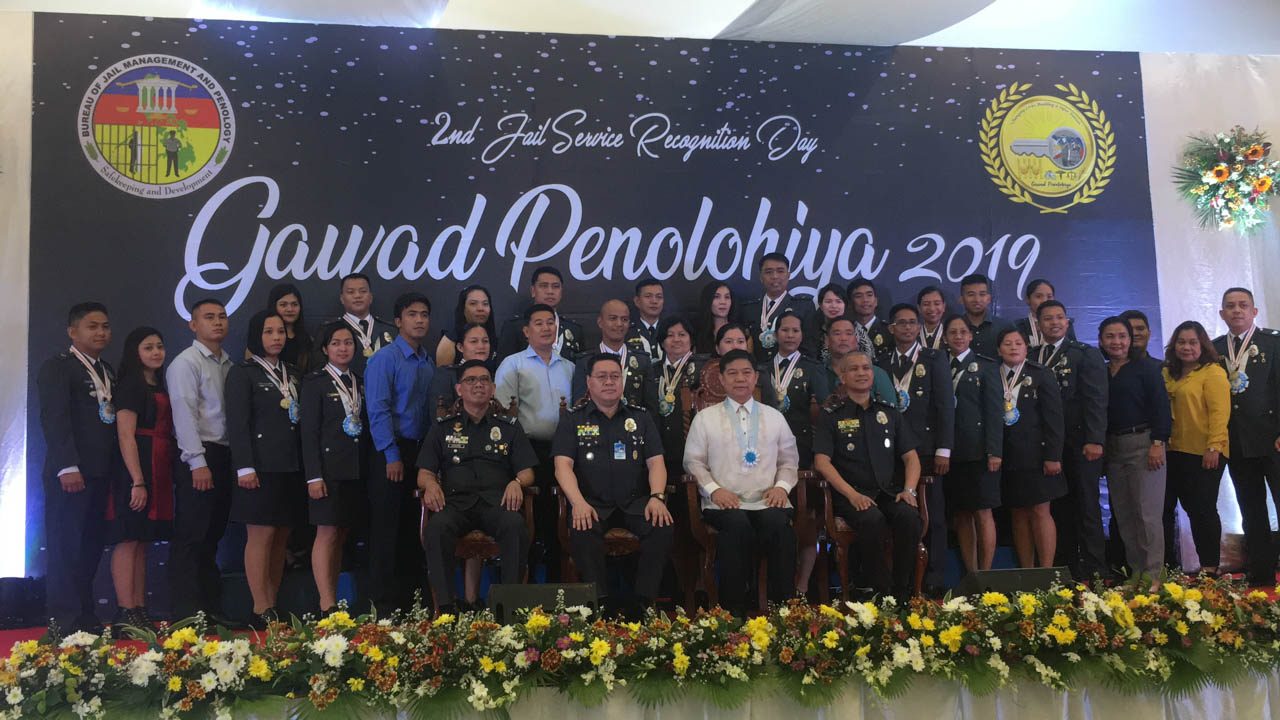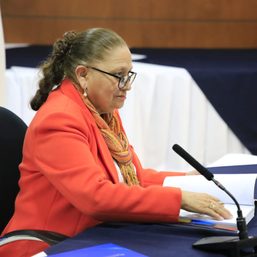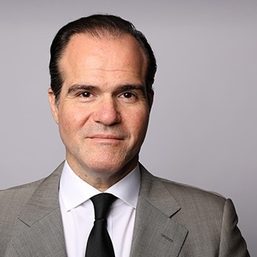SUMMARY
This is AI generated summarization, which may have errors. For context, always refer to the full article.

MANILA, Philippines – How do inmates go on with their lives while in jail?
Across the country’s 476 jails, jail officers not only secure and maintain jails, but also provide ways for inmates, or persons deprived of liberty (PDLs), to keep learning and growing even while imprisoned.
This poses a challenge for most, especially those who man highly-congested jails. In 2017, jails had a 589% congestion rate on average, meaning one officer oversaw 63 prisoners. (READ: Overcrowding in PH prisons: Is tech the solution?)
Amid corrupt and drug-linked jail officers, some personnel were lauded for their exemplary performance in delivering services to inmates and their families.
Last October 28, the Bureau of Jail Management and Penology (BJMP) recognized jail officers who beat the odds by effectively overseeing livelihood programs, community relations, alternative learning systems, and other services in their respective jails.
By doing this, they made a positive impact on those inmates and their families’ lives, as well as on their communities.
Alleviating their problems
In Tacloban, Jail Officer 2 Christine Abellar works at the male dormitory of the city jail. Every day, she faces inmates with all kinds of personalities.
She said this is just part of being a welfare development officer.
“Kailangan kalmado ka. Kailangan malawak ang pag-intindi mo sa kanila. Kapag naiistress sila may problema sila, ‘wag ka nang magdagdag,” she said.
(You need to be calm. You need to have patience. When they’re stressed because of their own problems, don’t aggravate them further.)
Abellar, wanting to alleviate some of the stress the inmates experience, found ways to help them even beyond the capacity of the jail.
She handles livelihood programs for inmates, which include baking and painting activities. She finds a way to enhance the inmates’ painting skills despite lacking a budget. Their paintings are then showcased or sold at programs outside of the jail.
“Kahit po walang budget para sa mga bagay na ‘yan, ginagawan po namin ng paraan para po sila ma-uplift ‘yung personality po nila. Instead na mag-isip ng hindi mabuti, maging mabuti ang gawin nila sa jail. So tinutulungan po namin sila sa mga gamit nila, para po sila makapagpaint,” she said.
(Even though there’s no budget for these things, we still make a way so that their personalities will be uplifted. Instead of thinking negative thoughts, they will be productive in jail. We help them get materials so they can paint.)
Aside from helping inmates, Abellar reaches out to their families as well, including two children whose parents are both currently imprisoned.
“[Kahit] ‘yung family nila na nasa labas, kung anong magagawa ko na matulungan ‘yung mga anak nila. Pinupuntahan po natin, inaasikaso kung anong magagawa natin. Ngayon may mga scholar po kami, anak ng PDL na talagang, wala silang makain, ‘di sila makapag-aral, at tinutulungan po namin para makapag-aral po sila,” Abellar said.
(Even for their families outside, we do what we can to help their children. We go to them, we take care whatever needs we can. Now, we have scholars, children of PDLs who cannot eat and cannot study, so we intervene for them to be able to study.)
Providing opportunities for growth
In Bataan District Jail, alternative learning system (ALS) classes are held from Tuesday to Friday.
For Jail Officer 1 Denniece Dilig, who was lauded as the best ALS implementor in the Philippines, implementing these classes is difficult due to the lack of a conducive learning environment in the district jail.
“Minsan nakakadistract kasi maraming mga problema sa pamilya nila ‘pag dumadalaw, minsan naman ‘yung iba walang dalaw,” she said.
(At times, it’s distracting because they encounter problems with their families who visit, and sometimes they don’t have visitors at all.)
But she reminds them that this learning program will serve as preparation for when they are freed.
“Bilang ALS implementor, I always talk to them na sasabi ko nang, ‘pag wala ka mang dalaw ngayon, o nanghihina ka ngayon, isipin mo magagamit mo ‘tong edukasyon para paglabas mo mas marami kang matututunan, mas marami kang opportunities na maibibigay sa’yo,” she said.
(As an ALS implementor, I always talk to them and say that if no one visited you today, or if you feel down today, just think that you will use this education when you get out of jail, and you will learn many more things so you can have more opportunities.)
At the end of the day, Dilig is proud of what they’ve accomplished, especially with their basic literacy program for previously illiterate inmates.
“Dati hindi sila marunong magbasa, ngayon po kahit siguro English po nakakaintindi na talaga sila po. ‘Yun po ‘yung nakakatuwa bilang isang ALS teacher po tsaka bilang isang jail officer, na makikita po na dati ‘yung PDL po na walang alam pero ‘pag nakita niyo po sa labas, talagang may grateful heart po sila,” she said.
(Before, they didn’t even know how to read, and now they can even understand English. That’s what I find uplifting as an ALS teacher and as a jail officer, I get to see them from when they barely knew anything to when they get released, having a grateful heart.)
Reaching out on behalf of inmates
Since jail officers cannot implement alternative learning systems by themselves, they employ the help of the Department of Education (DepEd) and/or the Technical Skills and Development Authority (TESDA). They also get help from government agencies for other programs and services for PDLs.
Keeping a good relationship with these agencies is crucial, and thus requires an officer who can handle relations well. Senior Jail Officer 1 Rey Comprendio, who works at the Zamboanga City Jail, was hailed as the best community relation service officer across the country.
Aside from coordinating with local government offices, non-government agencies, and potential stakeholders, he also ensures that communities, especially the families of inmates, know what PDLs are going through.
One such program with this goal is Oplan Toklaw, short for “toktok, dalaw”. In this initiative, Comprendio said that they go from door to door and ask inmates’ families to find time to visit them in the city jail.
He also handles a “calibrated” Oplan Toklaw dubbed Radyo Toklaw, wherein inmates can broadcast their messages and sentiments so that their families could hear them. When asked what the most common concern of PDLs is, Comprendio answered that is the slow progress of their trials.
While the BJMP has implemented a paralegal training program to allow quick releases for more inmates, there are still numerous cases that remain pending. According to Comprendio, their inmates usually ask their loved ones to follow up their cases in court through Radyo Toklaw.
“So considering na congested po ‘yung jail namin , so hindi naman ma-cater at the most soonest time ‘yung mga PDL… So kaya nga ‘yun ang problema nila na importante talaga ‘yung pamilya na sila mismo magfofollow up sa court when it comes to ‘yung mga court proceedings,” he said.
(Considering our jail is congested, we cannot cater to each of them at the soonest time. That’s why they have this problem, and it’s important for their families to follow up their cases in court themselves.)
Motivating factors
These 3 jail officers are some of the 52 individual awardees of the BJMP’s second Gawad Penolohiya awards. Individual awardees receive decorations and P5,000 in cash.
BJMP Spokesperson Xavier Solda said that this award could motivate jail officers to perform their duties better. Comprendio also said that the Gawad Penolohiya rites motivate jail officers to improve the services of their facility, extending to communities as well. He also said it helps for public awareness about the challenges faced by both PDLs and the BJMP.
For Dilig, it’s more than that. Her father is currently in the hospital, and she said she dedicates this award to her parents.
“[Medyo] nahihirapan po kami pero inaalay ko nga po ‘tong award na ‘to para sa magulang ko po… Kasi sila po talaga ‘yung nagtaguyod sa akin at sila po ‘yung nagpakita sa’kin na before anything else eto binigay sa’yo ang trabaho na ‘to, pagbutihin mo at binigay sa’yo ng Panginoon,” she said.
(We are struggling right now, but I dedicate this award to my parents because they are the ones who raised me and showed me that before anything else, I should do well in my job because God gave it to me.)
Similarly, Abellar also grapples with her own problems. She experiences hardships regarding her family and her finances. “Dumadating ang time na parang nabibigatan ako… nakakaramdam na ako ng parang ayaw ko na, parang nabibigatan na ako sa mga responsibilidad,” she said.
(There are times when I feel heavy, I feel like I can’t take it anymore, the responsibilities weigh me down.)
But even with these challenges, she continues to do her job because she believes that she was sent by God to help people. Her award only strengthened her will to keep doing her job.
“Parang ang Diyos kasi, hindi naman siya personal na bababa dito sa atin eh. Gagamit talaga siya ng tao. [‘Pag] magstop ako, alam ko ginagamit tayo ng Diyos, ‘pag magstop tayo, sino naman ang tutulong kung ‘di tayo magpapatuloy?” she said.
(The Lord does not come down to us personally. He uses people. If I stop, and I know we are being used by God, if we stop, who will help?) – Rappler.com
Add a comment
How does this make you feel?


![[WATCH] Try This: Empanada Salteña from Argentina](https://www.rappler.com/tachyon/2023/04/try-this-empanada-saltena-argentina.jpg?resize=257%2C257&crop=765px%2C0px%2C1037px%2C1037px)


There are no comments yet. Add your comment to start the conversation.